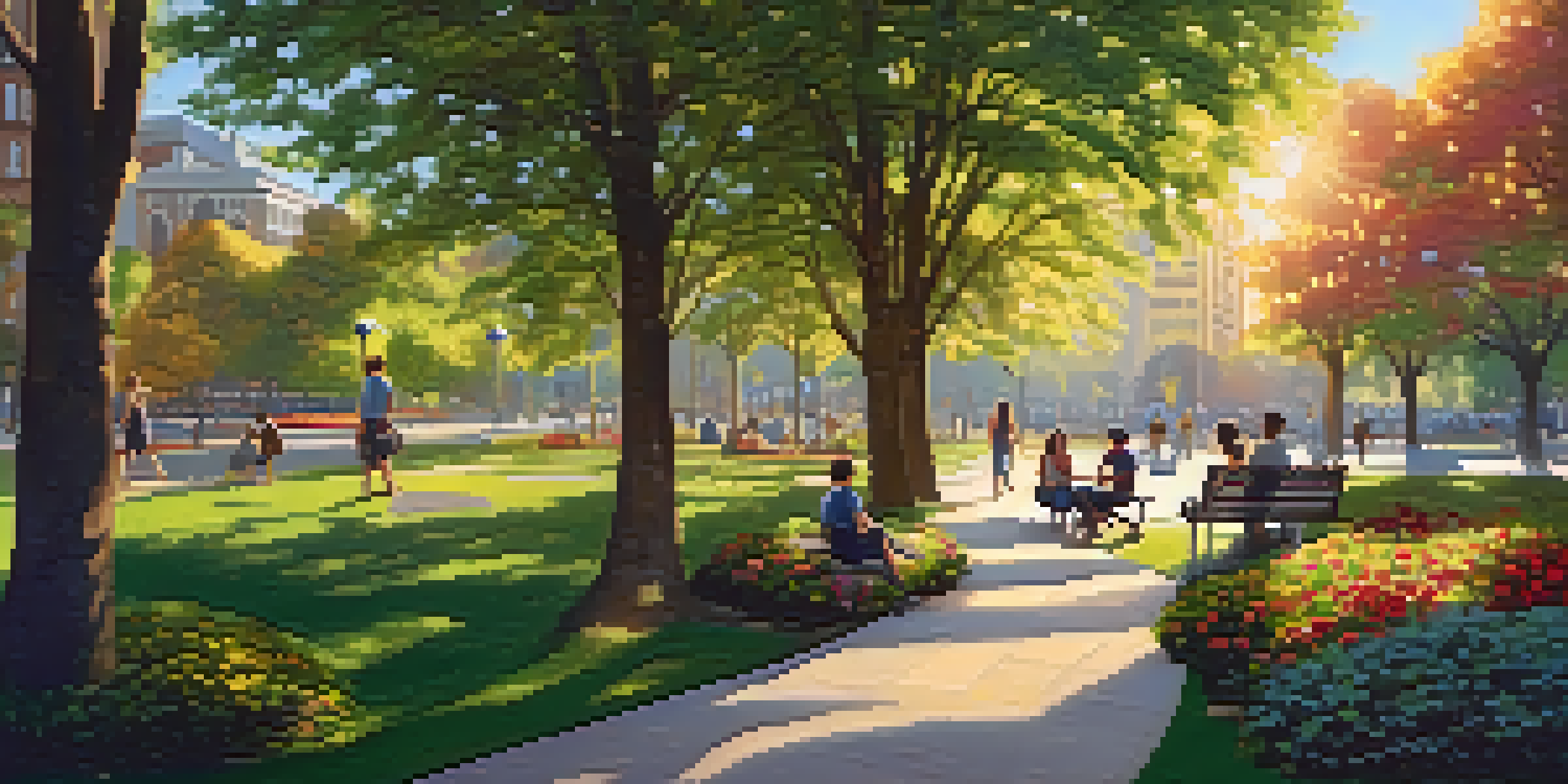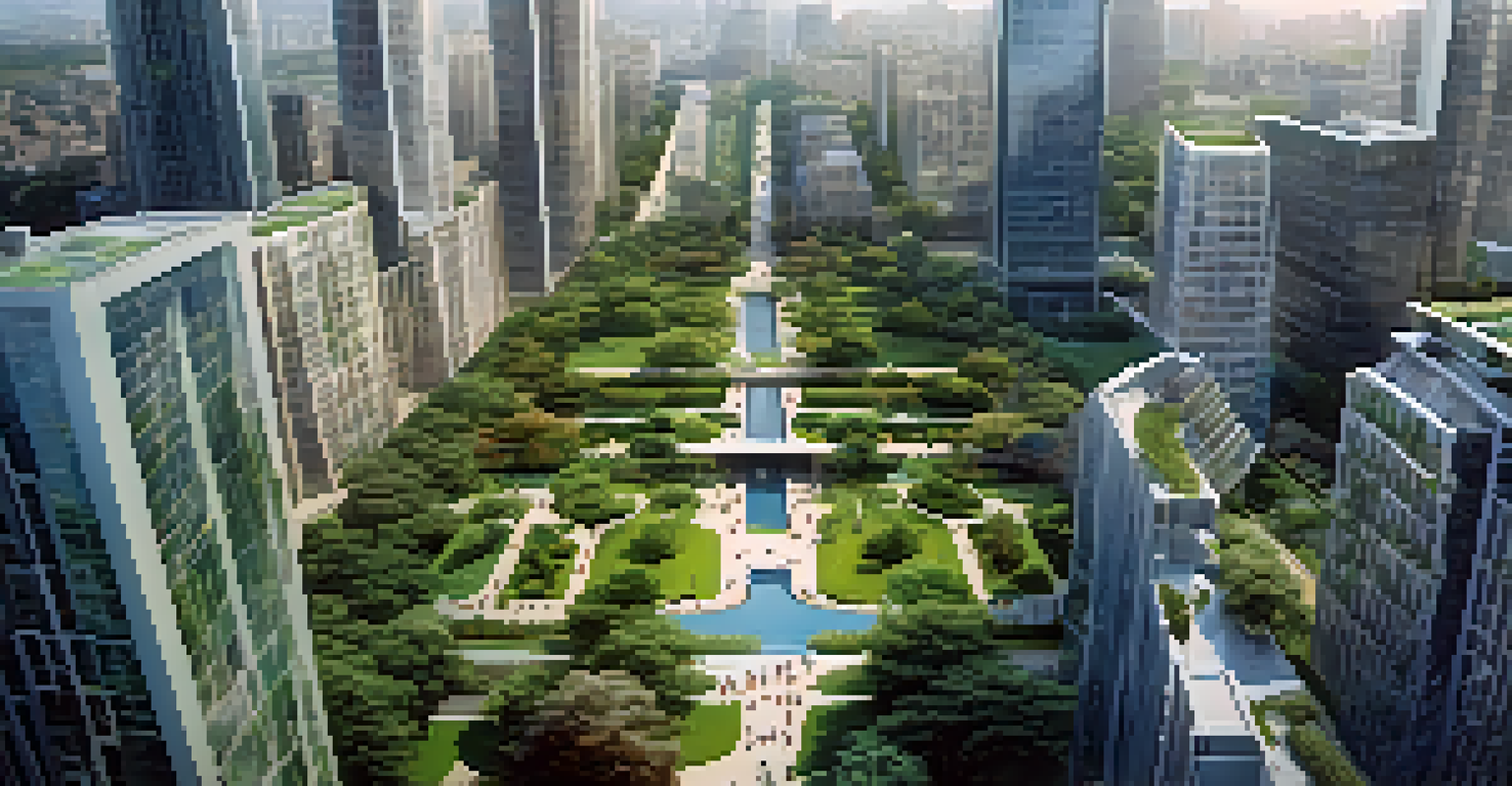Exploring the Impacts of Urbanization on Mental Health

Urbanization: A Double-Edged Sword
Urbanization is a phenomenon that brings both opportunities and challenges. On one hand, it fosters economic growth, improved infrastructure, and access to services. On the other hand, it can lead to overcrowding, increased stress, and social isolation, which negatively impact mental health. As cities expand, it’s crucial to understand how these changes affect our psychological well-being.
The greatness of a community is most accurately measured by the compassionate actions of its members.
In bustling urban environments, the pace of life often accelerates, creating a sense of urgency. This can lead to heightened anxiety and feelings of being overwhelmed. For instance, a person commuting in a crowded subway might experience claustrophobia or stress, which can accumulate over time, affecting their overall mental health.
Moreover, urbanization often alters social dynamics. While cities can provide opportunities to meet diverse groups of people, they can also foster loneliness and disconnection. The paradox of being surrounded by many yet feeling isolated can amplify mental health issues, making it essential to address these social challenges.
The Role of Green Spaces in Urban Areas
Green spaces, such as parks and gardens, play a vital role in enhancing mental health in urban settings. They provide a necessary escape from the concrete jungle, allowing city dwellers to reconnect with nature. Studies show that spending time in these natural environments can reduce stress, anxiety, and depression.

Imagine taking a leisurely walk in a city park, surrounded by trees and flowers. The sights, sounds, and smells of nature can significantly elevate mood and promote relaxation. This simple act can serve as a powerful antidote to the pressures of urban living, providing a mental reset.
Urbanization's Mental Health Impact
Urbanization can lead to increased anxiety and social isolation, challenging residents' mental well-being.
However, the availability of green spaces is often limited in densely populated areas. Urban planners must prioritize the integration of parks and recreational areas within city designs. Ensuring access to nature is crucial for fostering healthier urban communities and improving residents’ mental well-being.
Noise Pollution and Its Effects on Mental Health
Noise pollution is an often-overlooked consequence of urbanization, yet it can have profound effects on mental health. Constant exposure to loud noises, such as traffic and construction, can lead to irritability, anxiety, and even depression. It disrupts our ability to focus and relax, creating an ongoing sense of unease.
Nature does not hurry, yet everything is accomplished.
Consider the experience of living near a busy road. The blaring horns and rumbling engines can become a source of chronic stress, impacting sleep quality and overall mental health. Over time, this relentless background noise can feel suffocating, contributing to a decline in emotional well-being.
To combat these effects, cities need to implement noise-reduction strategies, such as sound barriers and better urban planning. Creating quieter, more serene environments can significantly enhance the quality of life for urban residents, promoting a healthier mental state.
Social Isolation: A Growing Concern in Cities
Despite being surrounded by people, many urban residents experience social isolation, which can be detrimental to mental health. The fast-paced lifestyle and the focus on productivity can lead individuals to prioritize work over relationships, resulting in loneliness. This disconnect can exacerbate feelings of depression and anxiety.
Think about the last time you saw a friend or family member in a busy city. With everyone caught up in their own lives, meaningful connections can easily fall by the wayside. This lack of community support is particularly troubling, as strong social ties are crucial for emotional resilience.
Green Spaces Enhance Well-Being
Access to parks and gardens in cities is crucial for reducing stress and promoting mental health among urban dwellers.
Addressing social isolation requires intentional efforts, such as community-building initiatives and social programs. By fostering connections among residents, cities can create a more supportive environment that enhances mental health and overall well-being.
The Impact of Economic Disparities on Mental Health
Urbanization often intensifies economic disparities, which can significantly impact mental health. Low-income neighborhoods may lack access to essential resources, such as healthcare and mental health services, leaving residents vulnerable to psychological distress. This inequality creates a cycle where financial strain exacerbates mental health issues.
For example, individuals struggling to make ends meet may experience chronic stress, leading to anxiety or depression. The pressure to provide for oneself or one's family in an economically disadvantaged area can be overwhelming, creating a sense of hopelessness.
To address these disparities, policymakers must focus on equitable development. Investing in underserved communities and providing access to mental health resources can help break the cycle of poverty and improve the overall mental well-being of urban populations.
Transportation and Its Effect on Mental Well-Being
Transportation is a critical aspect of urban living, and it can significantly influence mental health. Long commutes and unreliable public transport can lead to frustration and stress, taking a toll on emotional well-being. The time spent in transit could otherwise be used for relaxation or social interactions.
Imagine spending hours stuck in traffic or waiting for a late train. This daily grind can contribute to feelings of burnout and resentment, impacting both personal and professional life. The cumulative effects of such experiences can lead to broader mental health challenges.
Economic Disparities Affect Health
Economic inequalities in urban areas can exacerbate mental health issues, highlighting the need for equitable resource access.
Cities that prioritize efficient public transportation and alternative commuting options can alleviate some of these pressures. By making daily travel more manageable, residents can enjoy a better quality of life and improved mental health.
Coping Strategies for Urban Dwellers
Given the unique mental health challenges posed by urbanization, it’s essential for residents to develop effective coping strategies. Mindfulness practices, such as meditation and yoga, can help individuals manage stress and promote emotional balance. These techniques encourage a greater awareness of one’s thoughts and feelings, fostering resilience.
Consider how taking a few moments each day to focus on breathing can create a sense of calm amidst the chaos of city life. These small practices can empower individuals to reclaim their mental well-being, despite external pressures.

Additionally, building social connections and engaging in community activities can provide support and reduce feelings of isolation. By fostering a sense of belonging, urban dwellers can navigate the complexities of city life while maintaining their mental health.
The Future of Urban Living and Mental Health
As urbanization continues to grow, understanding its mental health implications is critical for future city planning. Emphasizing mental well-being in urban design can lead to healthier, happier communities. This includes integrating green spaces, reducing noise pollution, and ensuring access to mental health resources.
Envision a future city where mental health is prioritized alongside economic development. This vision would not only enhance quality of life but also foster resilience among residents, ultimately benefiting society as a whole.
By addressing mental health proactively, urban planners and policymakers can create environments that support emotional well-being. Investing in mental health initiatives today can lead to thriving urban communities tomorrow, where residents feel connected, supported, and empowered.